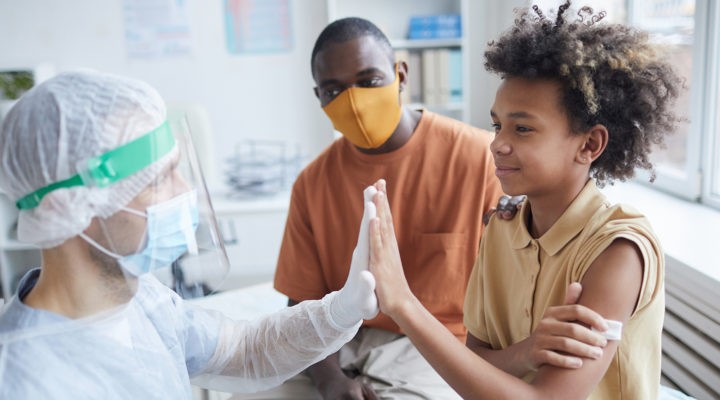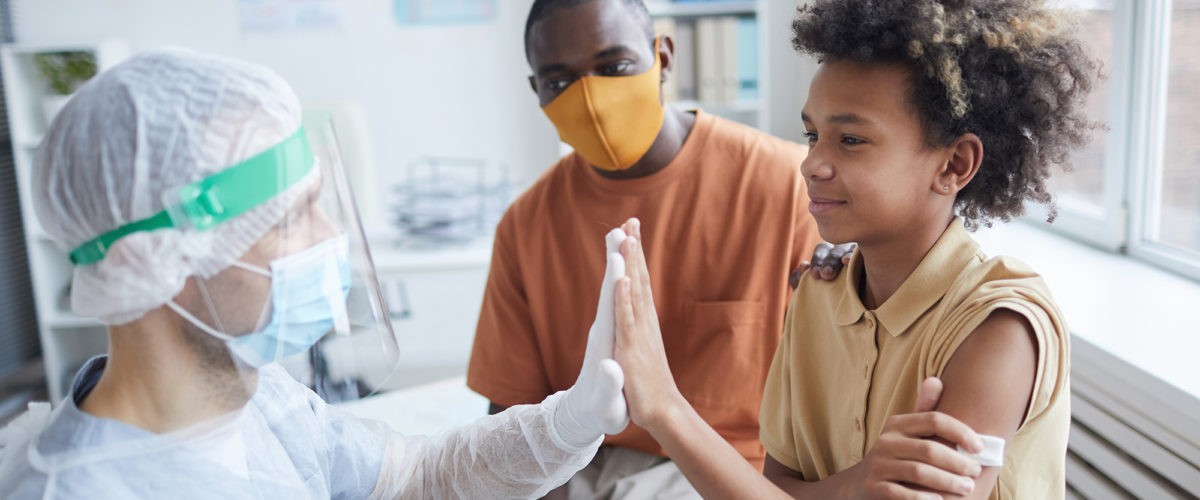Even parents who are willing to be vaccinated against COVID-19 themselves may be hesitant to have their eligible children vaccinated, according to new data from Public Religion Research Institute and Interfaith Youth Core.
That finding doesn’t surprise Rhonda Walton, a Dallas pediatrician who has counseled parents about vaccinations for several decades.
“I understand that parents may not want to have their children be among the first to get the vaccine. Unfortunately, COVID isn’t giving us time to wait,” said Walton, who has served primarily in clinics for low-income and uninsured clients and who raised four boys herself.
The PRRI/IFYC study conducted in June found that only 35% of parents of children under 18 say they will get their children vaccinated as soon as they can, while another 40% are hesitant to get their children vaccinated at all.
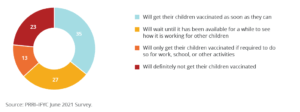 Fully one-fourth of parents (27%) said they will wait to see how vaccines are working for other children before getting their children vaccinated. And 13% said they will only get their children vaccinated if it is required for work, school or other activities.
Fully one-fourth of parents (27%) said they will wait to see how vaccines are working for other children before getting their children vaccinated. And 13% said they will only get their children vaccinated if it is required for work, school or other activities.
More worrisome to the public health cause, 23% of parents said they simply will not allow their children to be vaccinated.
Parents’ practices predict attitudes for children
The increased hesitancy about vaccinating children shows up strongly among parents who are unvaccinated themselves but also appears prominently among parents who have been vaccinated.
Among parents who are vaccine acceptant, 56% are vaccine acceptant for their children, 36% are hesitant, and only 7% say they will not get their children vaccinated, PRRI/IFYC reported. Among vaccine-hesitant parents, just 3% plan to get their children vaccinated as soon as possible, 81% are hesitant to get their children vaccinated, and 13% say they will not get their children vaccinated.
Parents who are vaccine rejecters for themselves almost uniformly said they will not get their children vaccinated (94%).
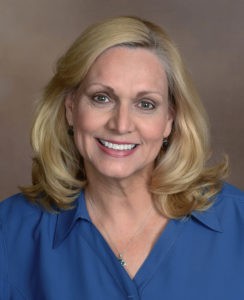 “It shouldn’t be surprising that many parents are more hesitant about getting their children vaccinated against COVID-19 than they are about getting the vaccine themselves. And, to a point, this is a valid thought process,” Walton explained. “Pre-pubertal children are not just smaller-sized adults. Every system in a child’s body is still developing, and careful study of a new pediatric vaccine is essential.”
“It shouldn’t be surprising that many parents are more hesitant about getting their children vaccinated against COVID-19 than they are about getting the vaccine themselves. And, to a point, this is a valid thought process,” Walton explained. “Pre-pubertal children are not just smaller-sized adults. Every system in a child’s body is still developing, and careful study of a new pediatric vaccine is essential.”
The current risks
But the ravages of the current COVID resurgence in America, combined with the realities of kids going back to in-person school, makes the ability to wait and see less tenable, according to Walton and other pediatricians. Over the past week, doctors increasingly appeared on TV news, in online videos and on social media explaining the huge uptick in numbers of children hospitalized due to COVID.
“No vaccine is ever 100% safe,” Walton explained. “I passionately advocate for standard pediatric vaccines because there is no doubt in my mind that the risk of getting these vaccines is far smaller than the risk of the diseases they prevent. We are at the same place with the COVID-19 vaccine. I would encourage parents of kids 12 years and older to get their kids vaccinated.”
The truth parents need to understand, she said, is that the COVID vaccines have been studied and found to be safe, and the threat of illness or death is real.
“The risk right now of children getting COVID-19 and becoming ill or having long-term issues is significant, far greater than that of the vaccine.”
“The risk right now of children getting COVID-19 and becoming ill or having long-term issues is significant, far greater than that of the vaccine. The best way to protect children of all ages at this point is to make sure that all of their adult contacts are vaccinated.”
Nothing new in vaccine hesitancy
Vaccine hesitancy among parents is nothing new. In fact, the anti-vax movement among parents has become a cottage industry in America, often fueled by debunked conspiracy theories that will not go away.
“The hesitancy to vaccinate a child, in general, is at times based on completely erroneous information from a myriad of anecdotal, internet and social media sources,” Walton said. “So, while what’s presented (with COVID) is similar to what pediatricians have encountered for years from vaccine-hesitant parents, it seems amplified — and more dangerous — now because of even more ubiquitous misinformation, political and religious polarization, and the need to process an overwhelming barrage of daily input — usually bad news — in general.”
PRRI and IFYC found that disinformation about the pandemic in general and vaccination in particular has driven vaccine hesitancy among parents. The latest polling found that among parents who believe in the QAnon conspiracy theories only 21% say they will get their children vaccinated, compared to more than half of parents who reject QAnon.
Demographic differences on vaccinating kids
Other social demographics that have defined Americans in their response to the pandemic also show up in opinions about vaccinating children.
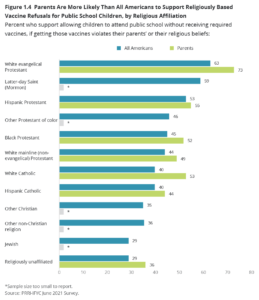 White evangelical Protestants (18%) and Hispanic Protestants (27%) are the least likely religious groups to say they have gotten their children vaccinated or will get their children vaccinated as soon as possible. More than one-third (36%) of white evangelical Protestants say they are hesitant to get their children vaccinated, and 42% say they will not get their children vaccinated.
White evangelical Protestants (18%) and Hispanic Protestants (27%) are the least likely religious groups to say they have gotten their children vaccinated or will get their children vaccinated as soon as possible. More than one-third (36%) of white evangelical Protestants say they are hesitant to get their children vaccinated, and 42% say they will not get their children vaccinated.
Hispanic Protestants are much more likely to be hesitant (52%) than to refuse vaccines for their children (19%). Around one-third of white mainline Protestants (33%), Black Protestants (35%), and religiously unaffiliated Americans (35%) are vaccine acceptant for their children. Four in ten white Catholics (40%) and around half of Hispanic Catholics (48%) say they have or will get their children vaccinated.
Among other demographic differences:
- Half of Democrats (49%) are vaccine acceptant for their children, while 37% are hesitant and 12% say they will not get their children vaccinated.
- More independents are undecided, with 33% acceptant, 47% hesitant, and 19% refusing vaccines for their children.
- Republicans are least likely to be acceptant (24%), while 38% are hesitant and more than one-third (36%) say they will not get their children vaccinated.
- Male parents are more likely than female parents to say they will get their children vaccinated as soon as they can (41% vs. 30%), and male parents of color are even more likely to say so than their white counterparts (47% vs. 37%).
- Parents with high school degrees or less are half as likely as those with postgraduate degrees to say they will get their children vaccinated as soon as possible (26% vs. 52%), while those with some college experience but no degree (31%) and those with four-year college degrees (45%) fall in between.
The importance of finding trustworthy sources
Again, the present debate over COVID vaccination appears to be an amplification of some long-existing trends, Walton explained.
“As a Christian, I’m always confounded by the subset of those who — as outspoken Christians — dismiss any scientific or public health discussion at all and focus entirely on ‘individual rights’ without any desire to at least consider data on how their individual choices might harm others,” she said. “This is an argument I’ve heard frequently in my years of practice, and I suspect it plays some part in the religious and political disparity reflected in these surveys.
“I struggle with finding this emphasis on individual rights anywhere in the teachings of Christ.”
“I struggle with finding this emphasis on individual rights anywhere in the teachings of Christ. This focus seems to be even more pervasive in the COVID-19 vaccine discussion than with vaccines in general.”
And the political disparities that show up in attitudes on COVID and vaccines seem to have permeated the discussion of vaccinating children, Walton observed. “It likely reflects the wide range of information sources that parents consume. Political views should have no role in healthcare decisions about our kids, but I’m afraid parents are getting completely different ‘facts’ depending on their politically driven ‘news’ consumption.”
Just because some news sources claim to be “faith-based” doesn’t mean they are reliable or accurate, she added. These are, “unfortunately more and more a reflection of political biases. Decisions about vaccines (or vaccine exemption) should be based on medical issues and risks, never political or religious beliefs.”
As a pediatrician, her advice to parents is to get information about their children’s medical care from reliable sources such as the family pediatrician, the American Academy of Pediatrics, the AAP’s website specifically for parents called Healthy Children, and the Advisory Committee on Immunization Practices.
Related articles:
Francis Collins: ‘Give God the glory’ for vaccines ‘but roll up your sleeve’
6 things you should know about the COVID vaccine | Opinion by Christy Edwards and Jen Dilts
While Americans reject COVID vaccines, other parts of the world beg for access

